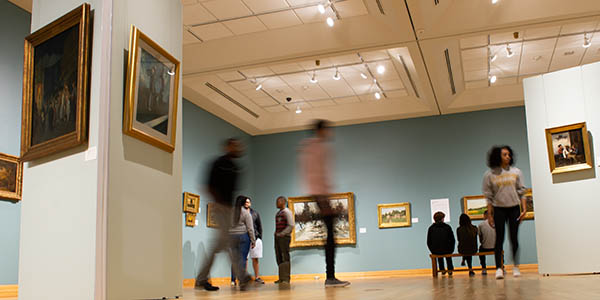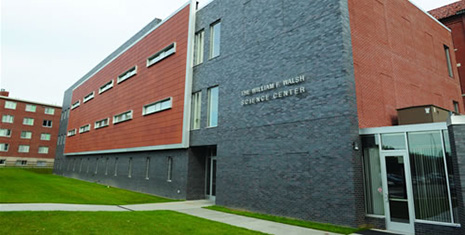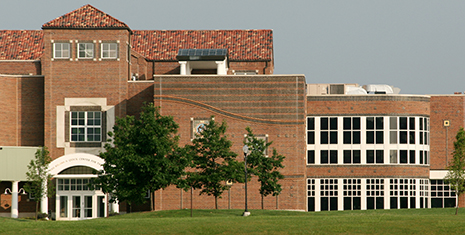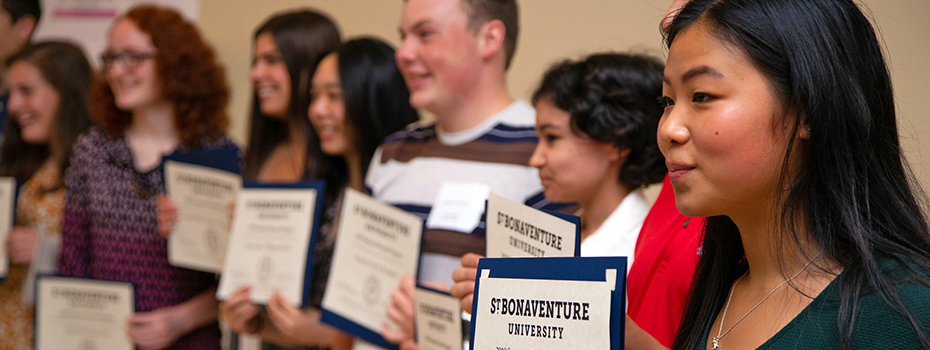School of Arts & Sciences
Welcome to the largest and most diverse school at St. Bonaventure University. With some 40 majors and minors, excellent faculty and multidisciplinary programs, we offer something for everyone.
- Master of Science in Cybersecurity
The Master of Science in Cybersecurity, available 100% online, presents a cutting-edge curriculum that prepares you to protect businesses and individuals from malicious cyber attacks and data theft.
- Master of Social Work
The online Master of Social Work program is available in both a Traditional and Advanced Standing track. The degree gives you the clinical knowledge to compassionately empower individuals and families so they can reach their full potential. The Traditional track of this program is designed for students without a social work degree and who seek a meaningful new career as a clinically licensed social worker. The Advanced Standing track is designed for those who already hold a Bachelor of Social Work and who are looking to further their career.
We service most of the courses for the General Education curriculum and the Honors Program. In addition, all university students, regardless of the school in which they're enrolled, take many of their classes within our school.
Preparation for wherever that next step leads
Arts & Sciences is an excellent source for professional training for any number of careers and for graduate school preparation.

Students looking ahead to post-graduate study in the health care field may take advantage of the university’s Franciscan Health Care Professions Program, and our Center for Law and Society prepares our students for law school.
We develop programming that responds to changing societal demands and student interests. We offer bachelor's and master's degrees in the increasingly important and popular field of cybersecurity. We also offer an early assurance program in cybersecurity, guaranteeing qualified high school seniors placement in our master's program upon completion of their bachelor's degree.

William F. Walsh Science Center
 Regina A. Quick Center for the Arts
Regina A. Quick Center for the Arts
Modern centers for the arts & sciences
State-of-the-art facilities not only accommodate student research, creativity and performance, but serve as regional hubs for student and community engagement.
The Walsh Science Center houses state-of-the-art computer science, laboratory and classroom space, biology labs, organic and general chemistry labs, a Natural World lab, a 150-seat indoor amphitheater, and faculty offices integrated with lab space for better student-teacher accessibility.
Walsh stands adjacent to stately De La Roche Hall, the oldest academic building on campus, which underwent an interior top-to-bottom renovation coinciding with the opening of Walsh. The buildings are connected on two floors by glass-enclosed walkways.
The Quick Center for the Arts, an architecturally unique structure located in the middle of campus, offers a rich cache of resources for academic instruction in the visual and performing arts.
The QCA houses a 321-seat theater, spacious art galleries and exhibit halls, instructional space, instrumental and vocal music rehearsal rooms and suites, classrooms, a musical instrument digital interface lab, among other offerings.
Quick Center for the Arts
Experiential learning: The Expo & much more
Our annual Arts & Sciences Exposition is a celebration of our students' exceptional research and creativity, and just one of many ways in which an Arts & Sciences education extends beyond the classroom at SBU.
Held each spring in the University Conference Center, the Expo is a popular two-day event that allows the campus community to review outstanding work of students mentored by faculty in the School of Arts & Sciences.
Experiential learning in the School of Arts & Sciences doesn't end with the Expo. Many of our academic programs require internships, mentored research or capstone projects. Others encourage public service, emphasizing the personal growth that comes from using your knowledge and talents to help others.
Here is a sampling of experiential learning opportunities within the School of Arts & Sciences:
- Biochemistry majors earn 4 credits for a year-long independent research project. As a senior capstone, each biochemistry major works with the program director to prepare and deliver an oral presentation of their own research. Students also present
their research findings at regional and international conferences, and coauthor peer-reviewed publications. See biochemistry student research
- Biology majors have the opportunity to participate in research with faculty members each semester, and the Borer Fellowship is a 10-week summer research experience in which students work in the lab with faculty researchers. See biology student research.
- As part of a required core curriculum course, students model the lives of Saints Francis and Clare of Assisi by volunteering with an agency or project that assists a marginalized population.
- English students may work on The Laurel, the student-run literary magazine; write, study and perform
poetry with the Chatterton's Poetry Club; or earn academic credit in an internship course.
- Sociology students volunteer at the Warming House, the student-run soup kitchen in Olean, to better understand issues related to social stratification. See sociology experiential learning.
Visit individual academic program websites for additional experiential learning opportunities.

Programs for area school students and teachers
The university hosts a number of annual events that foster interest in the arts and sciences among high school students across the region, and that aid the professional development of teachers in STEM fields.
This program, held each summer, is for high school sophomores and juniors interested in computer science and biology. Students explore career opportunities while working alongside SBU faculty on authentic research.
Student Research Program
This lab development workshop for K-12 math and science teachers, held each summer and led by faculty from the university's departments of biology, chemistry, physics, computer science and psychology, aims to bridge the gap between K-12 and college STEM education.
K-12 Science & Math Teacher Workshop
The Regina A. Quick Center for the Arts hosts programs for young artists as well as arts educators. Activities include gallery tours, music and dance masterclasses, and juried exhibitions for school-age artists. These activities and more are available through our Arts Education program
Art Teacher Professional Development Day

SBU history prof explores roles of pandemics in 1920 and 2020 presidential campaigns
Jul 22, 2020 In a paper posted Tuesday (July 14) by the Jandoli Institute, Phillip G. Payne, chair of the Department of History at St. Bonaventure University, examined how the flu pandemic of 1918 impacted the 1920 presidential campaign and how the coronavirus may affect the 2020 race for the White House.
“When comparing 1920 and 2020, context is vital,” Payne wrote. “In 1920, people lived in a different world. We can learn from their experiences, but it is not the same.”
Payne’s paper, The Politics of Remembering the 1918 Pandemic and Forgetting the 2020 Pandemic?, is the fourth post in the Jandoli Institute’s summer Media Studies Across Disciplines project, a collection of research essays connecting different academic disciplines with the field of communication.
Payne said the 1920 and 2020 presidential campaigns are similar because they forced candidates to adapt to new media landscapes and social climates defined by a pandemics, social unrest and economic uncertainty.
However, the flu pandemic was less of a factor in 1920 than it is likely to be in 2020.
“It could be that one of the reasons the 1918 pandemic was forgotten is that it seemed normal, more extreme, but normal,” Payne explained in the essay. “Americans in 1918 lived in a society in which plagues, wars, and famines regularly killed.”
“In 2020, for most Americans, epidemics and pandemics have been a remote thing from other parts of the world, not something that forced them to stay home and shutter the economy,” he said.
Payne will present his paper on Zoom at 7 p.m. Thursday in a format modeled after academic conference presentations. He will summarize the paper and then take part in a panel discussion with Louis Jacobson, senior correspondent at PolitiFact; Brad Lawrence, a political consultant and strategist who owns Message & Media, and Joseph Marren, a professor in the Communication Department at Buffalo State University.
The session is open to the public and may be accessed at https://sbu.zoom.us/j/99687232637.
The institute will post a new Media Studies Across Disciplines essay on its website every Tuesday through Aug. 11. Thursday Zoom presentations will follow several of the presentations.
The essays were authored by St. Bonaventure faculty members who used their knowledge and expertise to provide insight and analysis from their own individual perspectives. Faculty from biology, history, nursing, philosophy and sociology contributed to the project, which was funded by the Leo E. Keenan Jr. Faculty Development Endowment and the Jandoli School of Communication. The essays were selected through a blind peer-review process.
The Jandoli Institute serves as a forum for academic research, creative ideas and discussion on the intersection between media and democracy. The institute, accessible at jandoli.net, is part of the Jandoli School of Communication at St. Bonaventure University.